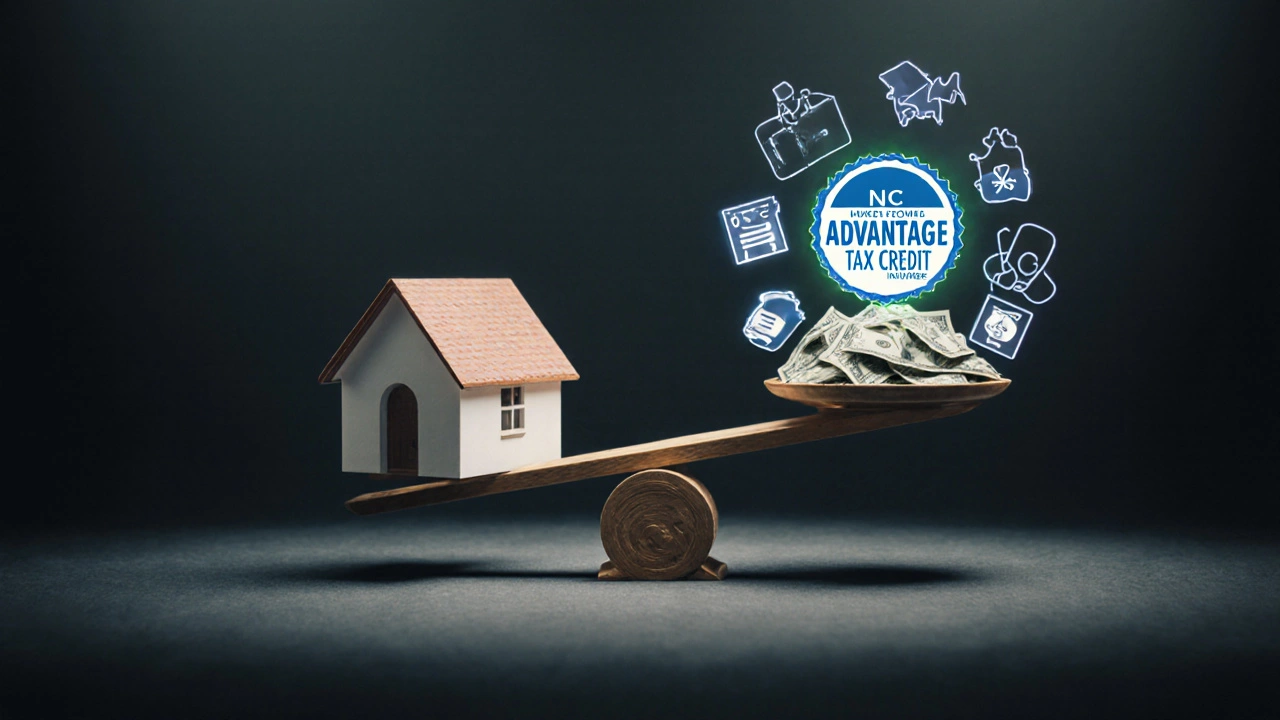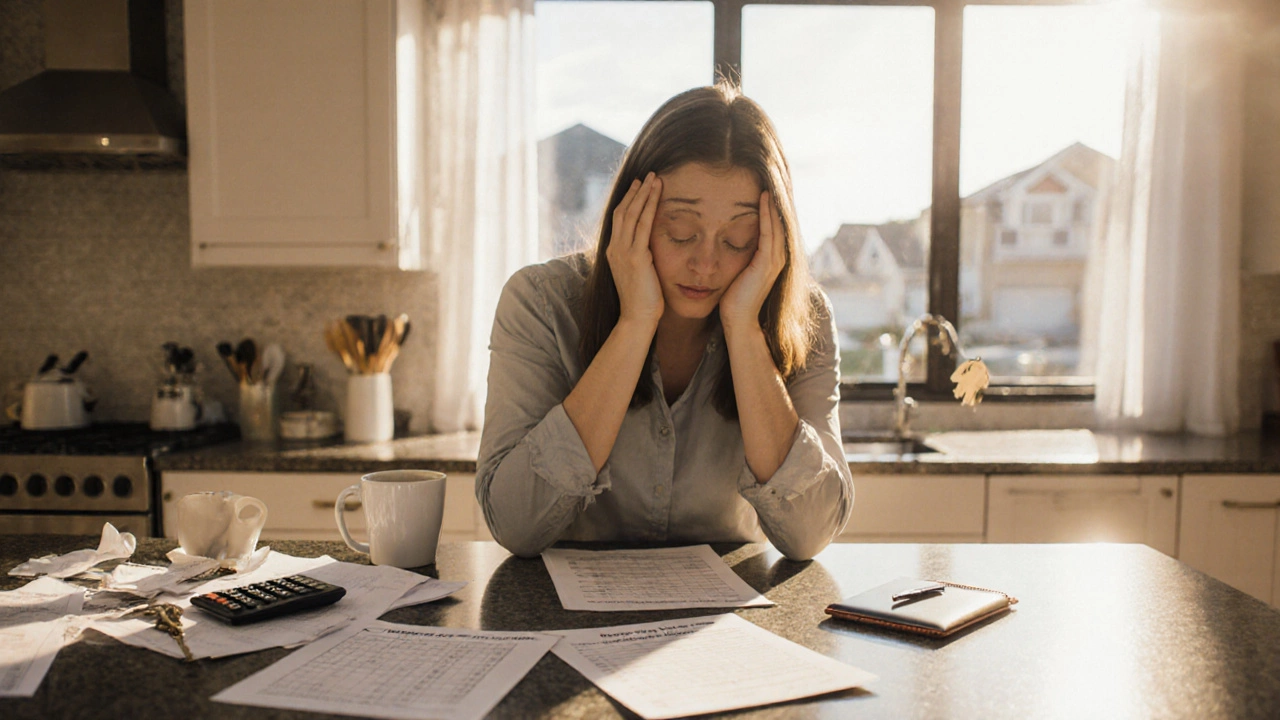North Carolina Closing Cost Calculator
Estimate Your Closing Costs
Buying your first home in North Carolina feels exciting-until you get the closing cost bill. Many first-time buyers expect to save for a down payment, but they’re shocked when they see how much extra cash they need at closing. In North Carolina, closing costs typically range from 2% to 5% of the home’s purchase price. That means for a $300,000 house, you could pay between $6,000 and $15,000 just to sign the papers. There’s no magic formula, but knowing what’s included helps you plan better and avoid last-minute stress.
What Exactly Do Closing Costs Cover in North Carolina?
Closing costs aren’t one single fee. They’re a mix of lender charges, government fees, and third-party services. In North Carolina, the biggest chunks usually come from:
- Lender fees: Application fee, origination fee, underwriting fee. These are set by your mortgage company.
- Appraisal fee: Around $500-$700. Your lender requires this to confirm the home’s value matches the loan amount.
- Home inspection: $300-$500. Not required by lenders, but every first-time buyer should get one. It can save you thousands later.
- Title insurance: $800-$1,500. This protects you and your lender from ownership disputes. In NC, the seller usually pays for the owner’s policy, but you pay for the lender’s policy.
- Recording fees: $100-$200. Paid to the county to officially file your deed and mortgage.
- Property taxes: You’ll prepay a few months’ worth at closing. It varies by county-Wake County averages $1,500-$2,500 for six months on a $300K home.
- Homeowners insurance: You must pay the first year’s premium upfront. Expect $900-$1,500 depending on coverage and location.
- HOA fees: If you’re buying in a community with an association, you may need to pay dues upfront or a transfer fee.
Some of these fees are non-negotiable. Others, like the home inspection, are optional-but skipping them is like driving without a seatbelt. You might get lucky, but the risk isn’t worth it.
Who Pays What in North Carolina?
North Carolina follows a custom where buyers and sellers split certain costs. It’s not law, but it’s the standard practice:
- Buyer pays: Lender fees, appraisal, home inspection, title insurance for the lender, recording fees, property tax prepayment, homeowners insurance.
- Seller pays: Real estate commissions (usually 5-6%), owner’s title insurance, transfer taxes, any agreed-upon repairs.
That’s why sellers sometimes agree to pay a portion of your closing costs. It’s called a seller credit. If you’re a first-time buyer with tight cash, asking for a 3%-5% credit can make the difference between closing and walking away. Many lenders allow this, as long as the home appraises for the full price.
How to Estimate Your Closing Costs Accurately
You can’t guess your closing costs. You need a Loan Estimate from your lender. By law, they must give you this document within three days of your application. It breaks down every fee in plain language.
Here’s a real example from a $320,000 home in Charlotte:
| Fee Type | Estimated Cost |
|---|---|
| Lender origination fee | $3,200 |
| Appraisal | $650 |
| Home inspection | $420 |
| Lender’s title insurance | $950 |
| Recording fees | $180 |
| Property taxes (6 months) | $1,900 |
| Homeowners insurance (1 year) | $1,100 |
| Escrow setup | $150 |
| Total | $8,550 |
This adds up to 2.7% of the purchase price-right in the average range. But notice: if you skipped the inspection or bought a cheaper insurance policy, you’d save $570. That’s not worth the risk. A single hidden issue found during inspection could cost $10,000 to fix.
Where First-Time Buyers Get Surprised
Most first-time buyers assume closing costs are just paperwork fees. They don’t expect:
- Prepaid interest: You pay interest from your closing date to the end of the month. For a $300,000 loan at 6.5%, that’s about $500-$700.
- Home warranty: Some buyers buy this for peace of mind. It’s $400-$600 and covers appliances and systems for a year.
- Survey fees: Rare in urban areas, but common in rural NC. $300-$500 if your lender requires it.
- HOA transfer fees: Some communities charge $200-$500 just to process your membership.
These add up fast. One buyer in Raleigh thought they had $10,000 saved for closing. They forgot about prepaid interest and the HOA fee-and came up $1,200 short. They had to borrow from family to close. Don’t let that be you.
How to Lower Your Closing Costs in NC
You can’t avoid all closing costs, but you can reduce them:
- Ask the seller to pay: In a buyer’s market, sellers are more willing. Include a request for 3%-5% in your offer.
- Choose a lender with low fees: Credit unions often have lower origination fees than big banks. Compare Loan Estimates side by side.
- Bundle your insurance: Some insurers give discounts if you buy homeowners and auto policies together.
- Wait to close at month-end: If you close on the 28th instead of the 1st, you pay less prepaid interest.
- Use a first-time buyer program: NC Home Advantage Tax Credit lets you get up to $8,000 in tax credits for closing costs if you meet income limits. You don’t get cash upfront, but you get a credit on your state tax return.
One buyer in Greensboro used the NC Home Advantage program and saved $5,800 over three years. That’s like getting a free down payment.

What Happens If You Don’t Have Enough Cash at Closing?
If you’re short, you have options-but none are ideal:
- Delay closing: Give yourself more time to save. But be careful-interest rates can change, and the seller might walk away.
- Ask family for a gift: Lenders allow gift funds, but you need a signed letter stating it’s not a loan.
- Roll costs into your loan: Some loans let you finance closing costs, but that raises your monthly payment and total interest over time.
- Walk away: If you’re overextended, it’s better to wait. Buying a home you can’t afford is a trap.
There’s no shame in waiting. The housing market won’t disappear. But getting trapped in a mortgage you can’t handle? That lasts 30 years.
Final Tip: Get a Closing Disclosure 3 Days Before Closing
By law, your lender must give you a Closing Disclosure at least three business days before closing. This is your final bill. Compare it to your Loan Estimate. If any fee went up more than 10%, you can ask for an explanation-or delay closing. Don’t sign until you’re sure everything matches.
First-time buyers often skip this step. They’re too excited. Don’t be that person. Read the numbers. Ask questions. This is your money.
Are closing costs negotiable in North Carolina?
Yes, some closing costs are negotiable. Lender fees like origination and underwriting can be reduced if you shop around. Seller credits for buyer’s closing costs are common in NC, especially in a buyer’s market. However, government fees like recording charges and title insurance rates are set by law and can’t be changed.
Can I use my down payment money for closing costs?
No. Down payment and closing costs are separate. Your down payment goes toward the home’s purchase price. Closing costs cover fees to finalize the loan and transfer ownership. If you use down payment funds for closing costs, you’ll need to come up with more cash for the actual down payment. Most lenders require the down payment to be your own money, not borrowed or redirected from other fees.
Do first-time buyers pay less in closing costs in North Carolina?
Not directly. Closing costs are the same for everyone. But first-time buyers can access programs like the NC Home Advantage Tax Credit, which gives up to $8,000 in tax credits to help cover closing costs over time. Some lenders also offer reduced fees for first-time buyers. So while the fees themselves don’t drop, there are ways to reduce your out-of-pocket expenses.
What’s the average closing cost on a $250,000 home in NC?
On a $250,000 home, closing costs typically range from $5,000 to $12,500. Most first-time buyers end up paying around $6,500-$8,000, depending on location, lender, and whether they pay for a home inspection or home warranty. Urban areas like Raleigh and Charlotte tend to be on the higher end due to higher property taxes and title insurance rates.
How soon should I start saving for closing costs?
Start saving as soon as you start thinking about buying. If you plan to buy in 12 months, aim to save 3%-5% of your target home price. For a $300,000 home, that’s $9,000-$15,000. Set up a separate savings account and automate transfers. Even $500 a month adds up to $6,000 in a year. Don’t wait until you find a house to start saving-by then, it’s too late.
Next Steps for First-Time Buyers in North Carolina
Before you start house hunting:
- Get pre-approved for a mortgage. This tells you how much you can borrow and what your monthly payment will be.
- Request Loan Estimates from at least three lenders. Compare fees, not just interest rates.
- Calculate your closing cost budget using the 2%-5% rule. Add 10% as a buffer.
- Check if you qualify for NC Home Advantage or other local first-time buyer programs.
- Open a dedicated savings account for closing costs. Don’t touch it.
Buying your first home in North Carolina is a big step. But with the right preparation, closing costs won’t be a surprise-they’ll be a manageable part of the journey.
